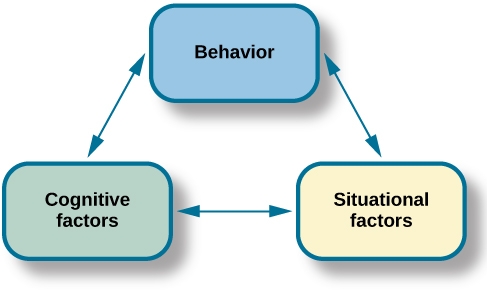Experts are tested by Chegg as specialists in their subject area. The social cognitive perspective of personality theorizes that human personality is an ever-changing amalgamation of the choices we make based on how we think about and judge the actions of others.

Social Cognitive Perspectives On Personality Boundless Psychology
Describe the social cognitive perspective on personality.

. Bandura pointed out that. Social Cognitive Theory of Personality describe the Social Cogntive Theory. Write a proposal completing the following.
In contrast to the psychodynamic approaches of Freud and the neo-Freudians which relate personality to inner and hidden processes the learning approaches focus only on observable behavior. State the social-cognitive perspective on personality and describe the concepts proposed by the two most influential theorists in this field. In contrast to the psychodynamic approaches of Freud and the neo-Freudians which relate personality to inner and hidden processes the learning approaches focus only on observable behavior.
By this it means that people can learn what is good and resist that which is terrible. This illustrates one significant advantage of the learning approaches over psychodynamics. Banduras Social Cognitive Theory.
In contrast to the psychodynamic approaches of Freud and the neo-Freudians which relate personality to inner and hidden processes the learning approaches discussed in this section focus only on observable behaviour. We review their content and use your feedback to keep the quality high. The social cognitive theory focuses on the effect of the environment on behavior and is based on theories of learning.
Major Theorists The main proponent of the social cognitive perspective is. Describe the social cognitive perspective on personality. Albert Bandura expanded cognitive personality theory by describing processes of observational or vicarious learning and the role of belief structures such as self-efficacy.
And b that people are best understood in terms of conscious cognitive capabilities that enable them to symbolically represent events to reflect upon themselves and to act as agents of their own development. Personal control is our sense of controlling our environments rather than feeling helpless. Social-cognitive perspective on personality is a hypothesis that underlines cognitive cycles like reasoning and deciding in the improvement of personality.
Identify the strenghts and weaknesses of the theory Brief background on Bandura Born in Alberta Canada in 1925 Doctorate at. This illustrates a significant advantage of the learning approaches over psychodynamics. Take a closer look at the definition of the social cognitive perspective explore.
Describe the social cognitive perspective on personality. In one theory the cognitive-affective personality system CAPS cognitive-affective. Some personality theorists have sought to weave situational factors into how personality is conceived.
The psychodynamic theory primarily focuses on the role of the unconscious mind. Learned helplessness is the hopeless and passive resignation an animal or human learns when unable to avoid repeated aversive events. Describe any behavioral or social cognitive theory aspects that are identified in these tests.
The social-cognitive perspective applies principles of learning cognition and social behavior to the understanding of personality. Psychodynamic trait or five-factor model humanistic and social-cognitive. The social-cognitive perspective applies principles of learning cognition and social behavior to personality with particular emphasis on the ways in which our personalities influence and are influenced by our interaction with the environment.
List and summarize the 3 or more tests you researched. The social cognitive perspective of personality emphasizes the importance of observational learning self-efficacy situational influences and cognitive processes. The Social Cognitive Theory of Personality.
This illustrates one significant advantage of the learning approaches over psychodynamics. According to the theory it articulates that Personality is something that an individual can learn from people. He argued that reinforcement does not simply work as a mechanism but it is actually the provider of information of the next reinforcement to be given once the behavior is repeated.
In his social cognitive theory of personality Bandura included the concept of observational learning as one of the main theoretical points. Bandura agreed that people develop and change as a consequence of the direct rewards and punishments they receive from the environment. Major theories of personality.
Reciprocal determinism refers to the interacting influences between personality and environmental factors. A that the psychological person the environment and behavior reciprocally influence one another. Apply the concept of reciprocal determinism.
Social-Cognitive Perspective views personality as influenced by the interaction between persons and their social context. Social cognitive theory is based upon two key principles. In this model of reciprocal causality internal personal factors in the form of cognitive affective and biological events.
Social cognitive theory explains psychosocial functioning in terms of triadic reciprocal causation Bandura 1986. Research a minimum of 3 free personality tests available online you may include the Big Five Personality Test you completed in Week 3. According to the theory individuals are social things That can learn from the environment.
The social cognitive theory says that people can learn how to behave by watching and interacting with others. The term causation is used to mean functional dependence between events. These cognitive cycles add to learned practices that are key to ones personality.

Social Cognitive Theory Trait Theory Psychology

Social Cognitive Perspectives On Personality Boundless Psychology
0 Comments